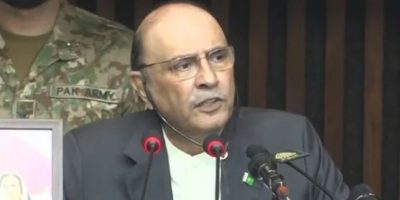Pakistan’s Ehsaas Emergency Cash programme averted an economic catastrophe: Report

ISLAMABAD, Mar 20 (DNA): A new report released on Saturday revealed that
Pakistan’s innovative emergency cash programme helped avert an economic
catastrophe during the COVID-19 pandemic.
Released by the International Policy Centre for Inclusive Growth
(IPC-IG), the report, “What’s next for social protection in light of
COVID-19: country responses” focuses on experiences from countries in
Asia, including Pakistan, sub-Saharan Africa, the Middle East and North
Africa (MENA), and Latin America and the Caribbean.
The deep dive into social protection responses to the COVID-19 crisis
highlights Pakistan’s effort to tackle poverty amidst the biggest global
crisis in more than a century and provides overall lessons for the
future including shock-responsive and universal social protection.
In Pakistan, the report analyses how the COVID-19 pandemic was a
watershed period for Pakistan in terms of government functioning: making
it more agile, data-driven, experimental, and ambitious.
“I welcome the analysis of this report on Pakistan quickly reacted to
the COVID-19 pandemic and focused on saving lives and livelihoods,” said
Dr. Sania Nishtar, Special Assistant of Pakistan’s Prime Minister,
Poverty Alleviation and Social Safety Ministry, Government of Pakistan.
“I hope lessons learned from Pakistan’s experience can help other
countries protect people during an emergency”, she further said.
Recounting Pakistan’s social protection response to the COVID-19 crisis,
the report says, “The Ehsaas Emergency Cash (EEC) programme demonstrated
how cash transfer programmes can be deployed to counter the
socio-economic fallout due to external shocks such as the COVID-19
pandemic. The lockdown in Pakistan—the fifth most populous country in
the world affected the livelihoods of 24.9 million.”
The study reveals that social protection had been an integral component
of Pakistan’s response to the crisis. In response to the economic impact
of the pandemic, the Government of Pakistan launched the emergency cash
transfer scheme and delivered approximately USD 1.1 billion to 14.8
million families at risk of extreme poverty. Each low-income household
received a one-time payment of USD75, enough to buy staple food items
for the four months.”
Further, the report highlights that the EEC programme augmented the
digital infrastructure already in place and followed a hybrid targeting
approach to identify beneficiaries. The programme accelerated the
adoption of cost-effective, digital initiatives that enabled new ways of
coordinating across multiple stakeholders and deploying a
whole-of-government approach.
The current Policy in Focus presents the key discussions of the global
e-conference: “Turning the COVID-19 crisis into an opportunity: What’s
next for social protection?” held in the first week of Oct 2020. At the
e-conference, Dr. Sania Nishtar was invited to represent Pakistan at the
country panel on Asia Pacific.
The IPC-IG is a global forum for international dialogue on innovative
development policies, guided by a partnership agreement between the
Government of Brazil, represented by the Ministry of Economy and the
Brazilian Institute for Applied Economic Research (Ipea), and the United
Nations Development Programme (UNDP).
The IPC-IG’s mandate is to promote the production and dissemination of
studies and policy recommendations, the exchange of best practices in
development initiatives and the expansion of dialogue among developing
countries.
=======
Related News

Pakistan won’t allow use of neighbouring territory to ‘destabilise our peace’: President Zardari
ISLAMABAD, MAR 2: President Asif Ali Zardari on Monday calling the war a last resort,Read More

PM Shehbaz offers condolences to Kuwait’s Crown Prince
ISLAMABAD, MAR 2 /DNA/ – Prime Minister Muhammad Shehbaz Sharif spoke with His Highness SheikhRead More


Comments are Closed